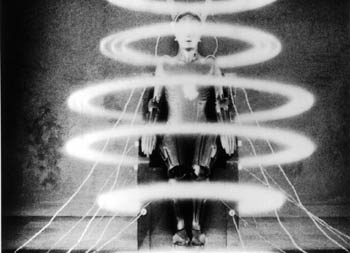![[Metroactive Movies]](/gifs/movies468.gif)
[ Movies Index | Show Times | North Bay | Metroactive Home | Archives ]
Refining a Masterpiece
Fritz Lang's 'Metropolis' shines even brighter
By Richard von Busack
Let's get to the point. The newly restored Metropolis reveals that Paramount Picture's butchering of this silent masterpiece in its initial U.S. run is an act of studio vandalism as infamous as the ruining of Erich von Stroheim's Greed or Orson Welles' Magnificent Ambersons.
Sometimes the rereleased versions of classics are not that epochal; sometimes they're just a welcome excuse to favor an old classic instead of a brand new Hollywood runt. The 1927 Metropolis is the most watched of all silent films today. It was never a huge success in its day, this famous story of a cyclopean city of the future with its heavenly towers and hellish guts. But it's since been plagiarized, imitated, and even brought back in various restored versions (including the popular 1984 version supervised by Giorgio Moroder, with a soundtrack of the decade's most banal bands).
So how is this Metropolis different? In every way. There's still a little less than 3,000 feet of film missing, but at nearly 1,000 feet longer than the last restored version in 1987, it's been digitally cleansed and timed, and assembled from parts in film archives from Paris to Canberra. Gottfried Huppertz's dramatic original orchestral soundtrack has been newly recorded, missing subplots retrieved or described, and censored material brought back.
Now the mad scientist Rotwang (Rudolph Klein-Rogge, who looks like John Lithgow) is revealed as a tragic, vengeful lover. His scheme to set a robot agent provocateur into Metropolis slums evolves from an old score to settle. This Metropolis is a male world, and thus it is ruthless. Essentially, the only woman in it is the saintly Maria (Brigitte Helm), an evangelist cloned by magic technology and held prisoner while her robot-double lies and prostitutes itself.
The hero, Freder (Gustav Fröhlich), the princeling son of the boss of Metropolis, is no longer a forehead-smiting muffin in jodhpurs. Now he's a true action hero whose risky descent into the heart of Metropolis frees its slaves. Though Freder is brave, he's also fanciful. His poetic hallucinations inspire him to fight. He imagines that the furnace is warming Metropolis as the flaming Babylonian idol, Moloch, actually feeds on human beings.
Director Fritz Lang makes this an intoxicating mix of dripping romanticism and Biblical fury. It's the cinema's most articulately expressed case of future shock. Metropolis is as pungent as a brilliant editorial cartoon, and it's not dated either. The drones marching into the city's dungeons still chafe the conscience.
Metropolis' repeated motto urges compromise: "Between the mind and the hands, the heart must mediate"--that only common decency can end the war between the haves and the have-nots. This ending was despised by the right and the left alike. Today, it seems insipid--and patronizing too: who decides whether someone's born a "head" or a "hand"?
And despite this film's pleas for order in a Germany that was already falling apart as the film was completed, something worse than a revolution happened. Instead of a rebellion, the German people marched into a Moloch of Hitler's own construction. More than an entertainment, Metropolis is a cautionary tale. For us, it's not too late.
[ North Bay | Metroactive Central | Archives ]
Copyright © Metro Publishing Inc. Maintained by Boulevards New Media.
![]()

Fantasia, Restored: Fritz Lang's 1927 silent film 'Metropolis' comes back better than ever.
'Metropolis' opens at the Rafael Film Center on Friday, Aug. 30.
From the August 29-September 4, 2002 issue of the North Bay Bohemian.